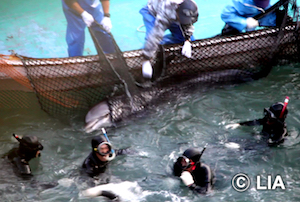What protections are cetaceans afforded by law? The short answer is “some, but not much”. At least nothing remotely close to what one would expect would be given to other species whose cognitive skills and social intelligence appear to rival our own. Thankfully, some are trying to change that. (See our website for an introduction to the important work of the Nonhuman Rights Project.) https://cetacanada.org/about-dolphins/nonhuman-rights/
But for now, here’s a brief look at where things stand.
Large whales are protected by the International Whaling Commission (IWC), which enacted a moratorium on whaling in 1986, and which continues to today. Unfortunately there are numerous exemptions, and a few countries – most notably Norway, Japan, and until this year Iceland (decisions on future years still pending) – choose to defy the ban on commercial whaling. On top of that, Japan had continued to kill over 330 Minke whales under the fraudulent pretext of “scientific research” until recently. In addition, countries can allow ‘non-zero quotas for subsistence hunts’, which results in the killing of thousands per year in Northern Canada & Russia, Alaska and Greenland.
Smaller cetaceans including dolphins, on the other hand, have almost no legal protection whatsoever. As such, they can be and are killed in their thousands. They are not protected at the international level by the IWC, and it’s debatable whether that organization would have jurisdiction over ‘small whales’.
At the national level, things get even murkier. Many countries have legislation to protect dolphins, but it’s very inconsistent from one to the next. In some cases they can’t be killed outright, but when tens of thousands die as an incidental result of ‘by-catch’ by the fishing industry, governments conveniently look the other way, as is the case in coastal waters of the E.U.
Japan presents a particularly challenging, not to mention depressing case. Dolphins can be legally killed, but the manner in which it is done appears to fly in the face of Japan’s own laws. Animal welfare legislation exists to minimise pain and suffering for farm, laboratory and domesticated animals, and there is also legislation to protect wild animals against cruel treatment. However, dolphins – whom I would argue are the smartest, most social, self-aware, sentient beings in the wild – are exempt from these protections. The reason for this is almost beyond belief, but wild marine mammals are treated not as mammals, but as “fishing resources”. Under the management of the Japanese Fisheries Agency, several hundred per year can be taken without having to consider the pain and suffering they experience through the process of being slaughtered for food or captured for captivity in the entertainment industry.
Over the past few years, Action for Dolphins has led the charge to try to bring about much needed change. Working with law firms both international and in Japan, as well as plaintiffs based in that country, they’ve been building a case to challenge the legality of the hunts. The suit was filed against the Governor of Wakayama, who is responsible for signing the annual permit that allows the Taiji hunts to take place. On the face of it, this might seem an easy case to win, as it isn’t difficult to prove that dolphins have been misclassified as fish, and thus are entitled to protection under animal welfare laws.
I don’t believe the governor’s office will ever be eager to argue the case in court, at least not on these issues. You simply can’t make the case that a dolphin is a fish, nor can you prove that the methods used to kill them are humane. But unfortunately they found a way to avoid having to do this.
In a hearing in October 2019, the court ruled that AFD and the plaintiffs in this case do not have legal standing to pursue this action. In other words, despite mountains of evidence already presented that these hunts are cruel and unsustainable, the court decided that the merits of the evidence don’t apply because individuals can’t challenge the legality of the hunts.
We are left wondering, given that the dolphins themselves aren’t going to challenge the legality of the hunts, who exactly does have legal standing to pursue this?
This is an enormous setback, but the case will be appealed to the next level of the Japanese court system, if at all possible. AFD remains committed to this cause for the long-term. This is a legal effort we all should support financially, to the fullest extent we can.
https://afd.secure.force.com/Donate/ActionforDolphins
This past season saw the slaughter of 560 of our fellow sentient beings. And perhaps the cruellest aspect of this is the 180 taken for a lifetime in captivity. Or the uncountable babies released back out to sea, where death is certain without the mothers they were separated from. We owe it to them to keep trying. Otherwise, on September 1st, it all begins again.
For The Orca’s Voice, Chris, Canadian Cetacean Alliance



Leave a Reply